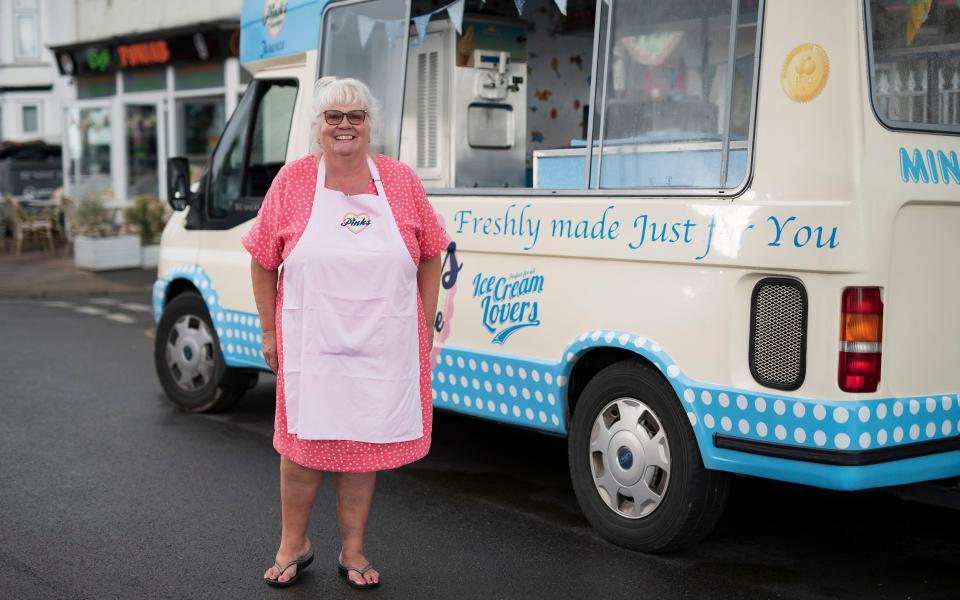‘We must change or we'll end up like milkmen’: how ice cream vans are fighting melting profits

Despite record-breaking temperatures enticing excitable children (and adults) to ice cream vans this summer, the British icon is facing a meltdown.
Dairy costs have soared and van owners, who must keep the vehicle running to power its machines, have shouldered eye-watering price rises at the pumps.
Ice cream vendors typically factor inflation into their pricing at the beginning of the year, but few predicted it would soar to such heights.
Katy Alston, president of the Ice Cream Alliance and founder of Pinks Vintage Ice Cream, has been in the business for two decades, but making a profit this year is increasingly unlikely.
“We won’t make much money, if any,” she said. “We don’t do many miles but the engine needs to be on when serving so I fill up every other day.
A tank of fuel used to be under £99, but we are way over that now.” Huge fuel price rises have forced the former nurse to reduce her rounds from five days a week to just two.
“We only do rounds on Thursdays and Fridays now, which saves a lot in costs,” said Ms Alston.
“But my fuel bill has still risen by about 40pc and I’m spending 50pc more on ingredients. “It’s the reality for most businesses at the moment and we are lucky because people can still afford to treat themselves to an ice cream, so the customer demand is still there.”
Food prices are among the hardest hit by inflation and vendors have been forced to pass on higher costs to customers.
The price of milk has risen by 28pc in 12 months, according to the Office for National Statistics, while the cost of oil and Cadbury Flakes, of which there is a global shortage, have increased by more than a quarter.
Long gone are the days when the price of a “99” ice cream cost less than a pound; customers in some tourist hotspots are now paying £5 for a cone.
Ms Alston added: “The first summer I launched my business it rained every single day. There are always challenges, but vendors and the community we serve pull together and support each other.
“But you certainly don’t go into ice cream if you want a planned-out life with a reliable income and pension.”

A crackdown by some local councils on vans running their engines to combat pollution in prime spots will also threaten business.
Van owners rely on the engine to run the machines that freeze and produce “Mr Whippy” ice cream – a favourite with customers.
Without the machines, vendors will be forced to rely on scoop ice cream and branded lollies, which customers can buy cheaper and in multipacks in the supermarket.
One option for ice cream sellers is to go electric. While vans powered by solar panels are costly, the investment will pay dividends in the long term with lower fuel bills.
‘We have to evolve or we will become obsolete like the milkman’
Zoe Philipson, of Tyne Valley Ices in Northumberland, is now paying 40pc more to run her fleet of five vans compared with last year.
“We have to evolve or we will become obsolete, like the chimney sweep or milkman,” she said. “We are big on sustainability and have solar panels at our factories, which have helped with energy costs. We buy stock from British suppliers to invest in the local economy.
“We are also moving away from selling lollies. Demand has dropped and they have become smaller and more expensive. It also costs about £60 a week in running costs to keep them in the freezer.”
The 29-year-old has also been hit with big price rises when making ice cream. The cost of milk powder has risen by a third and sugar prices have jumped by 40pc.
“We are definitely concerned about how much higher prices will go, but we have great support within the industry and from customers.
“We have adjusted our prices but have tried to be reasonable. We are pretty confident we’ll survive,” said Ms Philipson.

Those heading to the supermarket for their ice cream fix must pay inflated prices, too.
Sweet-toothed shoppers are paying 40pc more for a four-pack of classic Magnums, now priced at £3.50 compared with £2.50 in January, according to comparison site trolley.co.uk.
A six-pack of classic Cornetto ice creams costs £2.75 today, up more than 37pc from £2 at the beginning of the year.
The cost of a Cadbury Flake to accompany the cone has jumped by 28pc, with a four-pack now costing £1.25 compared with 98p in January.
But you will not find a true “99” ice cream in the supermarket aisle, added Ms Alston.
She said: “You can’t order it in a shop or online and we rely on that. “We also give customers a social interaction and that is priceless. Some of the people we serve haven’t seen anyone all day.”

 Yahoo Finance
Yahoo Finance 